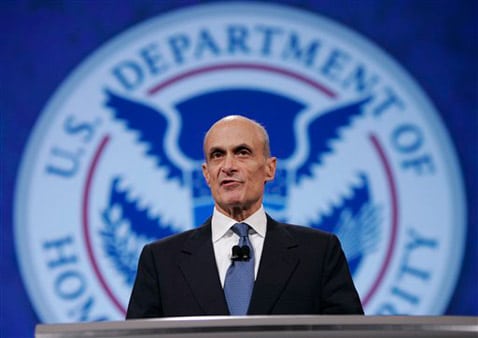
One of the most under-discussed yet consequential changes in the American political landscape is the reunion between the Democratic Party and the country’s most extreme and discredited neocons. While the rise of Donald Trump, whom neocons loathe, has accelerated this realignment, it began long before the ascension of Trump and is driven by far more common beliefs than contempt for the current president.
A newly formed and, by all appearances, well-funded national security advocacy group, devoted to more hawkish U.S. policies toward Russia and other adversaries, provides the most vivid evidence yet of this alliance. Calling itself the Alliance for Securing Democracy, the group describes itself as “a bipartisan, transatlantic initiative” that “will develop comprehensive strategies to defend against, deter, and raise the costs on Russian and other state actors’ efforts to undermine democracy and democratic institutions,” and also “will work to publicly document and expose Vladimir Putin’s ongoing efforts to subvert democracy in the United States and Europe.”
It is, in fact, the ultimate union of mainstream Democratic foreign policy officials and the world’s most militant, and militaristic, neocons. The group is led by two longtime Washington foreign policy hands, one from the establishment Democratic wing and the other a key figure among leading GOP neocons.
The Democrat, Laura Rosenberger, served as a foreign policy adviser for Hillary Clinton’s 2016 presidential campaign and chief of staff to two Obama national security officials. The Republican is Jamie Fly, who spent the last four years as counselor for foreign and national security affairs to one of the Senate’s most hawkish members, Marco Rubio; prior to that, he served in various capacities in the Bush Pentagon and National Security Council.
Fly’s neocon pedigree is impressive indeed. During the Obama years, he wrote dozens of articles for the Weekly Standard — some co-authored with Bill Kristol himself — attacking Obama for insufficient belligerence toward Iran and terrorists generally, pronouncing Obama “increasingly ill suited to the world he faces as president” by virtue of his supposed refusal to use military force frequently enough (Obama bombed seven predominantly Muslim countries during his time in office, including an average of 72 bombs dropped per day in 2016 alone).
The Democrats’ new partner Jamie Fly spent 2010 working in tandem with Bill Kristol urging military action — i.e., aggressive war — against Iran. In a 2010 Weekly Standard article co-written with Kristol, Fly argued that “the key to changing [Iran’s thinking about its nuclear program] is a serious debate about the military option,” adding: “It’s time for Congress to seriously explore an Authorization of Military Force to halt Iran’s nuclear program.”
Fly then went around the D.C. think tank circuit, under the guise of advocating “debate,” espousing the need to use military force against Iran, spouting standing neocon innuendo such as “we need to be wary of the Obama administration’s intentions” toward Iran. He mocked Obama officials, and Bush officials before them, for their “obsession with diplomatic options” to resolve tensions with Iran short of war. The Kristol/Fly duo returned in 2012 to more explicitly argue: “Isn’t it time for the president to ask Congress for an Authorization for Use of Military Force against Iran’s nuclear program?”
Beyond working as Rubio’s foreign policy adviser, Fly was the executive director of “the Foreign Policy Initiative,” a group founded by Kristol along with two other leading neocons, Robert Kagan and Dan Senor, who was previously the chief spokesman for the Coalition Provisional Authority in Iraq. That group is devoted to standard neocon agitprop, demanding “a renewed commitment to American leadership” on the ground that “the United States remains the world’s indispensable nation.” In sum, as Vox’s Dylan Matthews put it during the 2016 campaign, “If you want a foreign policy adviser with strong ties to the neocon world, it’s hard to do better than Fly.”
When it comes to this new group, the alliance of Democrats with the most extreme neocon elements is visible beyond the group’s staff leadership. Its board of advisers is composed of both leading Democratic foreign policy experts, along with the nation’s most extremist neocons.
Thus, alongside Jake Sullivan (national security adviser to Joe Biden and the Clinton campaign), Mike Morrell (Obama’s acting CIA director) and Mike McFaul (Obama’s ambassador to Russia) sit leading neocons such as Mike Chertoff (Bush’s homeland security secretary), Mike Rogers (the far-right, supremely hawkish former congressman who now hosts a right-wing radio show); and Bill Kristol himself.
In sum — just as was true of the first Cold War, when neocons made their home among the Cold Warriors of the Democratic Party — on the key foreign policy controversies, there is now little to no daylight between leading Democratic Party foreign policy gurus and the Bush-era neocons who had wallowed in disgrace following the debacle of Iraq and the broader abuses of the war on terror. That’s why they are able so comfortably to unify this way in support of common foreign policy objectives and beliefs.
Fair Use Excerpt. Read the rest here.

